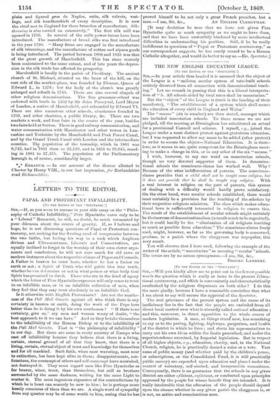THE NEW ENGLISH EDUCATION LEAGUE.
[TO THE EDITOR OF THE “SPECTATOR.']
SIR,—In your article thus headed it is assumed that the object of the League is a "uniform secular system of rate-built schools entirely divorced from all connection with denominational teach- ing." Let me remark in passing that this is a liberal interpreta- tion of "5. All schools aided by local rates shall be unsectarian."
But the " object " of the League is (such is the heading of their manifesto), "The establishment of a system which shall secure the education of every child in England and Wales."
The "means" (six in number) are then stated, amongst which are included unsectarian schools. To these means we are not pledged, till the meeting at Birmingham has substituted an actual for a provisional Council and scheme. I myself, e.g., joined the League under a most distinct protest against gratuitous education, but I was requested to allow my name to be added (after protest) in order to secure the object—National Education. It is there- fore, as it seems to me, quite competent for the Birmingham meet- ing to make a change in this, or in any other of the six " means. "
I wish, however, to say one word on unsectarian schools, though no very devoted supporter of them. In denomina- tional schools the conscience-clause has worked well. Why ? Because of the utter indifferentism of parents. The conscience- clause provides that a child shall not be taught some religion, but it does not provide that he shall be taught any religion. With a real interest in religion on the part of parents, this system of dealing with a difficulty would hardly prove satisfactory. On the other hand, were secular schools established, there would most certainly be a provision for the teaching of the scholars by their respective religious ministers. The class which makes educa- tional laws is sufficiently interested in religion to ensure this. The result of the establishment of secular schools might certainly be theincrease of denominationalism (a result much to be regretted), but it could hardly be the "elimination of all religious teaching as much as possible from education." The conscience-clause freely used, might, however, so far as the governing body is concerned, produce, in a parish where the clergyman was unpopular, this very result.
You will observe that I have used, following the example of the writer of the article, " unsectarian" RS meaning "secular "schools. The terms are by no means synonymous.—I am, Sir, &c.,
BROOKE LANIRERT.






























 Previous page
Previous page